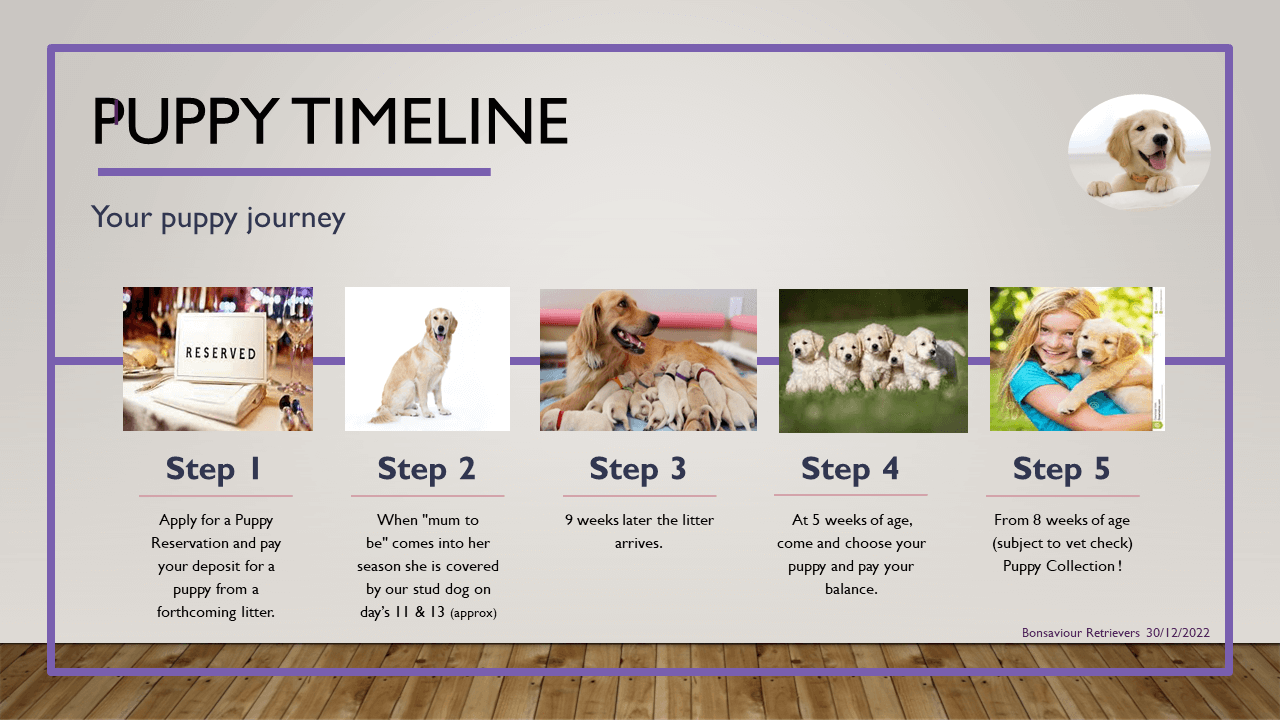

Application Form Below
All timings are governed by nature and may change without notice.
Golden Retriever Litters for sale

Puppy reservations are

Puppy reservations available for the Summer 2026 litter.

Puppy reservations are available for the Winter 2026 litter.
If you are looking to buy Golden Retriever puppies from Bonsaviour Retrievers, here is what you need to know:
Bonsaviour Retrievers is a reputable breeder known for producing high-quality Golden Retrievers. They focus on breeding dogs with excellent temperaments, intelligence, and health, making them great companions and suitable for various purposes. Their puppies are well-socialised and naturally reared for sound health, with excellent hip and elbow scores, clear eyes, and DNA clearance.
To purchase a puppy from Bonsaviour Retrievers:
Cost : Well-bred Golden Retriever puppies typically cost around £4,000. Reservation Process : You'll need to fill out an online application form specifying the litter you are interested in. Once your application is reviewed and accepted, you will receive an invoice for a deposit to secure your reservation. Viewing and Appointment : Visits are strictly by appointment only, ensuring a personalised experience when selecting your new pet.
If you would like more information or to ask about available litters, you can contact Bonsaviour Retrievers directly via their website or by phone to arrange a visit.
Price £4000 - Reservation Deposit £250 (non-refundable).
Please Complete The Puppy Reservation Form BEFORE making a payment.
Terms and Conditions of Deposit Stuff
All Bonsaviour Puppies have a Health Check and 1st Vaccine before leaving us.


This Frequently Asked Questions
Do i have to pay a deposit?
Yes, when making a puppy reservation a non-refundable deposit is payable.
Full T & C's are below & on our puppy application forms.
Purchase Timeline
Upon being offered a puppy reservation from a future litter. When in season, the bitch is covered by the healthy stud dog, pregnancy is confirmed 4 weeks later by ultrasound scanner, the litter arrives at approx 9 weeks. Puppy viewing is at 5 weeks old. Puppy can be collected from 8 weeks old after a veterinary health check and 1st vaccine.
Do i receive a puppy pack?
Absolutely. We provide puppy's 1st vaccine, microchip, 4 weeks free Petplan Insurance, a sales contract, a written health report from our Vet A guide to feeding & raising your puppy and other relevant documents.
Can i see the puppy's mum and dad?
Of course, at Bonsaviour Retrievers we have all our breeding dogs available for viewing.
Can i pay by card?
Yes, payments are made via an invoice sent to your email address. The invoice will have a secure link to make the payment via debit or credit card. We also have a card machine on site with the option to take payments via the phone.
Cash is ok too but we no longer take cheques.
Are you registered with the Kennel Club?
Bonsaviour is our Kennel Name registered with the Kennel Club for our Golden Retrievers
Silklake is our Kennel Name registered with the Kennel Club for our Beagles.
Are your dogs health screened?
Yes, our dogs are from healthy bloodlines and are screened for known disorders, Hip & Elbow scored with the BVA.
Bonsaviour Retrievers Terms & Conditions
By placing a deposit and reserving a puppy from Bonsaviour Retrievers, the buyer agrees to all the following terms and conditions: 1. Deposits are non-refundable unless, through some tragic accident, the reserved puppy were to die, be injured or develop a serious illness or disorder before going to the puppy’s new home. This does NOT include minor imperfections and/or common breed conditions, including, but not limited to, heart murmur grade 1 & 2, uneven bites, elongated soft palate, blocked tear duct, umbilical hernia, retained testicle/s & customer allergies, etc. Deposits may be rolled over to the next available litter. Bonsaviour Retrievers reserves the right to terminate the contract at any time without giving a reason. A deposit forms an agreement to purchase a puppy from Bonsaviour Retrievers and will be deducted from the full purchase price. A full puppy pack will be provided upon the collection of a puppy.
2. Balance due in cash, card or bank transfer only. Cheques are not accepted.
3. A puppy will not be released to the buyer until payment is made in full. Failure to pay the balance in full on the agreed-upon pick-up/delivery date voids this agreement, and the seller may offer the puppy to another buyer without further obligation to the buyer placing this deposit. Failure of the buyer to complete this purchase would subject the Seller to lost opportunities to sell the puppy to another buyer, and retention of the deposit is meant to compensate the seller for lost time and additional expenses incurred.
4. Puppy collection date is based on the Breeder’s estimation of when the puppy will be naturally weaned and ready to be placed in a new home. The Breeder reserves the right to retain the puppy past the original agreed-upon collection date if it is found to be beneficial to the health and well-being of the puppy. Please note puppies cannot legally leave their mother until reaching the age of 8 weeks.
5. The Buyer understands that should the puppy be sold with KC Endorsements, then, no breeding rights will be given. Endorsements may be removed by the breeder only if all known breed standard health checks have been made.
6. The buyer understands that there is no guarantee of size, weight, and/or colour of puppy at maturity.
7. The Seller reserves the right to void this transaction if made aware of any reason why a buyer might not provide a suitable environment for a puppy, or buying to resell, or buying as a gift for a third party. No puppies will be available for collection during the Christmas & New Year period.
8. The Seller cannot guarantee puppy availability, nor can the Seller guarantee puppy gender; the Seller only notes the customer's preference.
9. Puppies will be Vet Health Checked with a Vet's Written Report, and Puppies will receive 1st Vaccination, Microchip, 4 Weeks PetPlan Insurance and a Puppy Sales Contract/Puppy Pack.
10. Puppies remain the property of Bonsaviour Retrievers until paid for in full, regardless of microchip i.d. transfer. Final Balance payment is due once the Puppy has been chosen at 4 weeks of age.
11. No refunds are payable on returned healthy puppies or dogs for rehoming by Bonsaviour Retrievers.
12. We are unable to provide a puppy to a family with children under the age of 4 years.
All pregnancy timings are approximate and are subject to change. We are not a production line, and we can only predict our dogs' heat seasons. Should a bitch fail to take pregnancy, then reservations will be rolled over to the next available litter. We advise against booking events around the estimated litter arrival times, as it is up to nature when the puppies arrive!!

10 steps to buying a puppy

The five welfare needs
1. The need for a suitable environment

-
A comfortable place to rest and somewhere to be separate from others -
Space to exercise and explore
2. The need for a suitable diet

-
Appropriate diet for the dog’s life stage -
Feeding the right amount to prevent obesity or malnourishment -
Access to fresh clean water -
Avoiding food that may be poisonous or harmful
3. The need to exhibit natural behaviour

-
Exploring outside the house -
Play and mental stimulation -
Run / Dig / Jump -
The right type and amount of exercise
4. The need to be housed with or apart from other animals

-
To be housed with or apart from other dogs and people according to the dog’s needs -
The chance to interact with other dogs and people as appropriate
5. The need to be protected from pain, suffering, injury and disease

-
Access to veterinary treatment if they become ill or injured -
Mental well-being: appropriate socialisation and training and protection from situations that may cause prolonged anxiety or fear
-
Vaccinations (including annual boosters) -
Veterinary care (expected and unexpected) -
Puppy socialisation classes -
Training classes and training aids -
Worming and flea control -
Neutering -
Toys -
Insurance -
Bedding -
Food -
Collar and leads -
Ensuring your house and garden are suitably safe and enclosed -
Harness and crates for travelling in the car -
Puppy training indoor kennel or play pen -
Care for when you’re away -
Dog walker / pet sitter
Fitting in with your home and lifestyle
Breed health
Direct from the breeder
Rehoming charities
-
Have any of the puppies had health problems? Have either of the parents had any health issues? -
Has the breeder used any routine veterinary treatments for the puppies such as wormers? -
Has or will the puppies be given their first vaccinations prior to homing? -
Will the puppies be microchipped at 8 weeks? -
Have the parents been screened to check for the absence of any inherited diseases that can be tested in that breed? If so - what were the results? To make sure the breeder has interpreted the results correctly you will want to run them past a vet to check them. -
Has or will the breeder start to house train and socialise the puppies before they are homed? -
Have the puppies met and been handled by a range of different people? -
How many people interact with the puppies? Is it normal for the puppies to experience people coming and going to prepare them for normal household experiences? -
Are the puppies with people during the day, or do they only have contact at particular times (e.g. only for periods of play and feeding?) -
Have the puppies been microchipped?
Look at where the puppy lives
Meet the parents
Check the puppy’s health
-
Visible ribs -
Dull, scruffy coat -
Sore patches of skin -
Red or crusty eyes -
Runny eyes or nose -
Coughing -
Signs of diarrhoea, staining around the tail / bottom -
Signs of external parasites (e.g. fleas), such as black flecks in the fur, scratching, areas of hair loss, or thickened skin, for example around the ear edges or at the tail base. -
Weakness, wobbliness or difficulty standing up -
Becoming tired very quickly on interaction or play -
Noisy or laboured breathing -
Limping, difficulty walking or lifting legs -
A hunched or crouched body posture. -
Straining when passing faeces or urine
-
The breeder should supply you with microchip paperwork which includes your puppy’s individual identification number and database they are registered with. -
Vaccination records should be stamped by the veterinary practice and signed by a veterinary surgeon.
-
Experience during the very early weeks of life has a huge influence on your puppy’s behaviour as an adult. Seeing the puppy’s home will help you to tell whether the breeder’s interpretation of ‘wide experience’ is accurate. Has the puppy encountered loud noises, other dogs or unfamiliar visitors? -
Some puppies may be confident, curious and relatively ‘fearless’ about meeting new people. However, an overly active puppy may need careful training to ensure that problems such as over-boisterous play or attention seeking do not develop into aggression as it matures. -
Some puppies may be nervous and fearful or reluctant to interact. A puppy that doesn’t approach you freely, particularly if it shows signs of anxiety such as cowering or backing away, will need careful socialisation and desensitisation. It takes lots of patience to ensure that any fear or anxiety do not develop into behavioural problems as the puppy becomes an adult.
Congratulations!
-
Before you take your puppy home - make sure you have everything ready for them. For example, you will need to purchase things such as a bed, toys, food, water bowls, collar and lead in advance. It is also a good idea to buy a puppy crate or playpen to help you train the puppy to be separated from you and have quiet time. You will also need a supply of the diet the puppy has been fed by the breeder. -
It is essential that you register your puppy with a vet and book them in for a check-up and first set of vaccinations as soon as possible. If this is your first dog - visit several vets in your local area or speak to local dog walkers to select a practice that suits your needs. -
By law, the puppy must already be microchipped before it leaves the breeder. Make sure you change the owner details to your own as soon as you take the puppy home as it is a legal requirement to keep these details up to date. -
Check insurance providers in advance as well. Some charities and breeders may provide a short period of insurance cover which you can either take over and extend or arrange an alternative policy. Where this is not provided, it is a good idea to arrange for an insurance policy to start as soon as you pick the puppy up. -
Make sure you have everything arranged for transportation. A carrier and towels is a good idea – having a puppy on your lap is not a safe way to transport it, and the puppy may also suffer travel sickness on its first journey. -
Remember that however carefully you have chosen, no puppy is perfect and there will be an adjustment period for you, your family, other pets you have and your new puppy. Puppies are all unique individuals that quickly learn and adapt to the world around them, and you will need to make sure that you guide and train them to develop into a happy and much-loved companion for you and your family.